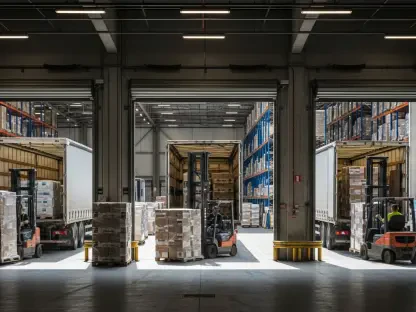The financial challenges facing the UK’s transport and logistics sectors have taken a toll, with rising costs and economic pressures creating a tough environment for businesses. Increased fuel, energy, and repair costs, coupled with leasing and fleet maintenance expenses, have become significant financial burdens. In addition, labor shortages and efforts to decarbonize the industry contribute to the increasing operational difficulties. As a result, many logistics leaders are expressing heightened pessimism about the future. According to the Barclays’ 2023 Logistics Confidence Index, confidence in the industry has decreased significantly, with a rating of 47.3. The data further revealed that 75% of operators reported more difficult business conditions compared to the previous year.
The impact of these financial stressors is exemplified by the fate of several businesses. Lochace Ltd, a Norfolk-based haulage firm, recently faced administration due to HGV driver shortages and rising maintenance costs. Similarly, Magnus Group, an Ipswich-based company, also went into administration after struggling with escalating electricity charges and business rates. Price Bailey’s data shows that over a 12-month period ending in September 2023, 463 haulage businesses in the UK filed for insolvency, representing a staggering 173% increase over two years. These figures highlight the dire situation faced by many logistics firms and underline the pressing need for effective financial management strategies.
Challenges Plaguing the Industry
A multitude of economic pressures are forcing UK transport and logistics businesses to navigate an increasingly complex landscape. Fuel prices, which fluctuate with global oil markets, have presented significant challenges. Companies must absorb or pass these costs to remain viable. Energy costs also continue to rise, driven by broader market conditions and regulatory changes focused on sustainability. The maintenance and repair of fleets add another layer of financial strain, especially as the industry faces a deficit of skilled labor capable of efficiently performing these tasks. These shortages drive up labor costs while extending downtime for essential maintenance, exacerbating the financial pressure.
High interest rates further compound these issues by increasing the cost of capital for businesses needing to finance fleet expansions or upgrades. The move towards decarbonization is adding another layer of complexity, requiring investments in new technologies and infrastructure to comply with emerging regulations. Competition within the logistics sector is fierce, with companies vying for market share while simultaneously striving to maintain profitability. The convergence of these issues often leads to reduced cash flow, making it harder for companies to invest in growth or even sustain their current operations.
Decreased confidence among logistics leaders reflects the gravity of these challenges. The Barclays’ 2023 Logistics Confidence Index offers a telling snapshot of industry sentiment, with a rating of 47.3 signifying prevailing pessimism. Notably, 75% of operators reported experiencing more difficult business conditions compared to the previous year, underscoring the widespread impact of these economic pressures. This decline in confidence can have far-reaching consequences, potentially stifling innovation and long-term planning as companies focus on short-term survival.
Potential Solutions through Optimized Insurance
Optimizing insurance programs presents a viable strategy for alleviating some of the financial pressures faced by transport and logistics businesses. By tailoring insurance coverage to match specific needs and risks, companies can manage costs more effectively. Lockton, a leading insurance provider, offers several strategies to help transport and logistics companies reduce their insurance-related expenses. These strategies include the use of Minimum & Deposit Premiums, which involve paying a discounted premium initially and paying the balance only if claims targets are breached. This approach allows companies to manage cash flow better, paying less upfront and accessing additional funds only if required.
Facilitating access to low-interest monthly installment facilities is another way to ease the financial burden. This method spreads insurance payments over time, making it easier for businesses to budget and manage their expenses. Additionally, Low Claims Rebates & Profit Shares can provide rebates if claims targets are met, offering a financial incentive for companies to minimize risk. Fixed Rating Agreements also contribute to premium stability over multiple years, shielding businesses from the volatility of fluctuating premiums. Structuring Effective Declaration Premiums for vehicle additions and deletions is another effective strategy, allowing firms to adjust their coverage based on their current operational needs without incurring unnecessary costs.
Analyzing Optimum Excess options involves finding cost-effective higher excesses that reduce overall premium costs while maintaining sufficient coverage. This strategy requires a balanced approach to ensure that the excess amount is affordable in the event of a claim, while still offering significant savings. Providing an Efficient & Effective Claims Service is paramount to reducing repair times, leasing costs, and third-party claims expenses. An optimized claims process ensures that businesses can return to normal operations swiftly, minimizing downtime and associated costs.
Navigating Financial Pressures with Strategic Insurance
The UK’s transport and logistics sectors are grappling with significant financial challenges, exacerbated by rising costs and economic pressures. Escalating expenses for fuel, energy, and repairs, along with leasing and fleet maintenance, are major financial strains. Additionally, labor shortages and the push to decarbonize the industry further complicate operations. Consequently, many logistics leaders are increasingly pessimistic about the future. The Barclays’ 2023 Logistics Confidence Index shows a marked decline, with the industry rating dropping to 47.3. Moreover, 75% of operators reported tougher business conditions compared to last year.
The repercussions of these financial strains are evident in the downturn of several businesses. Lochace Ltd, a Norfolk-based haulage company, entered administration due to HGV driver shortages and rising maintenance costs. Similarly, Magnus Group from Ipswich faced administration after struggling with soaring electricity charges and business rates. Data from Price Bailey indicates that in the 12 months leading up to September 2023, 463 haulage businesses in the UK filed for insolvency, marking a dramatic 173% increase over two years. These figures underscore the critical need for effective financial management strategies in the logistics industry.









